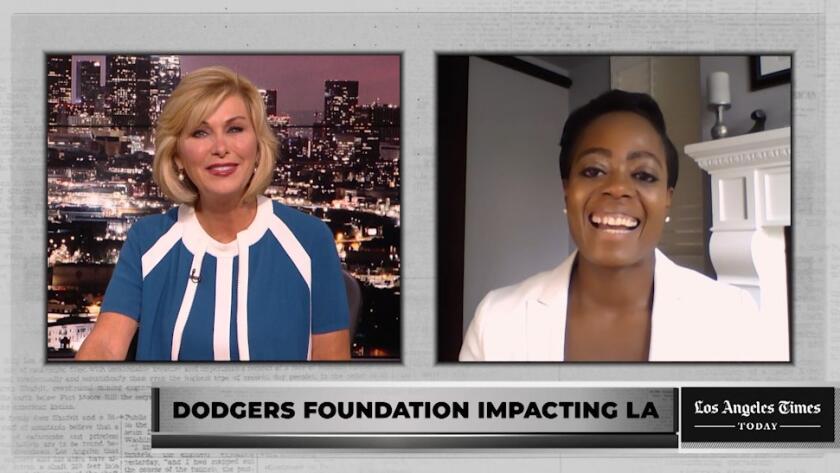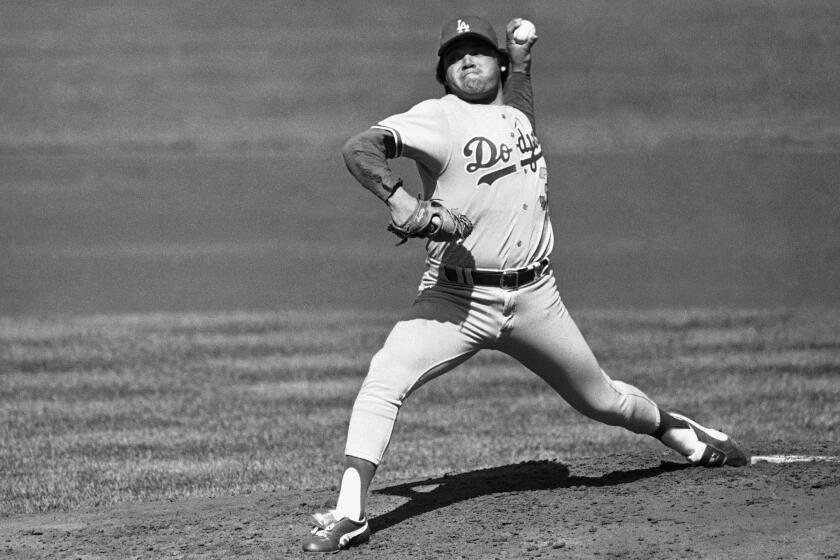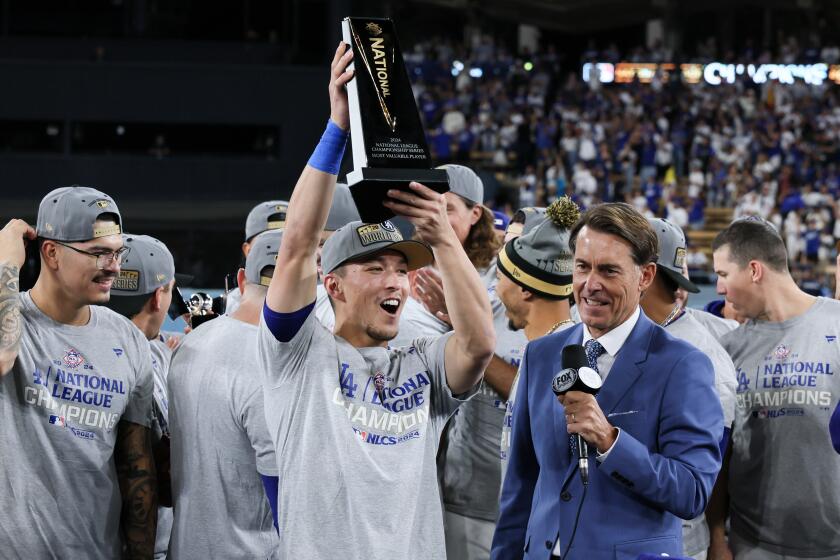Dodgers Foundation CEO Nichol Whiteman provides a strong voice for Black women
Nichol Whiteman’s first experience as the only Black female in the room was jarring. It came while attending boarding school atop a hill in a small town in Connecticut. She spent her high school years there after growing up in Manhattan, where diversity was organic, as the daughter of immigrants from Jamaica.
She excelled as a student, played soccer and was the only Black girl in her class all four years. Not once did someone look like her or share her experiences. There were times she was tempted to bail.
A quarter-century later, as she approaches her seventh anniversary as the chief executive of the Los Angeles Dodgers Foundation, she reflects on that discomfort with appreciation.
“It prepared me for this job and to exist in this environment,” Whiteman said. “And, frankly, it’s prepared me to be a voice in this moment today.”
Whiteman, 44, was hired in September 2013 to oversee the organization’s charity arm after spending time working in investment banking, publishing, education, and for the Jackie Robinson Foundation. She faced an uphill battle.
The foundation was undergoing a rebranding after scandal plagued the previous iteration — the Dodgers Dream Foundation — under the ownership of Frank and Jamie McCourt. The California attorney general investigated the compensation of Dodgers executive Howard Sunkin, who earned more than $400,000 from the foundation in 2007, which accounted for one-quarter of its $1.6-million budget. The Dodgers paid back the foundation.
Mookie Betts wouldn’t consider opting out like Dodgers teammate David Price because he’d lose the service time that will make him a free agent.
Only two full-time staff members were on the payroll when Whiteman hopped aboard. They were starting from scratch.
The foundation now employs 10 full-time staff members. It supports more than 100 nonprofit organizations with $21 million in investments over the last five years, has built 51 Dodgers Dreamfields, and has provided meals and donations to vulnerable populations during the coronavirus pandemic. Last month, the Dodgers were named ESPN’s sports humanitarian team of the year for the foundation’s work.
At the top stands Whiteman, one of the few Black women holding a prominent role across Major League Baseball.
“She is a work force, that’s what she is,” Dodgers President Stan Kasten said. “She is a force. She really does some job.”
While the industry laments the dwindling number of Black major league players, it has consistently failed to cultivate Black executives. And in recent weeks, following the death of George Floyd, the void has shifted more responsibility to people such as Whiteman.
Major League Baseball took nine days to respond to Floyd’s death, longer than the other major professional sports leagues. The delay generated criticism from fans and players. On Monday, Dodgers outfielder Mookie Betts, one of the most prominent Black players in the majors, said he believed “baseball did not do a good job with that.”
The Dodgers will open the 2020 season at home with a four-games series against the San Francisco Giants before playing the Houston Astros on the road.
Dodgers manager Dave Roberts, one of two Black managers in the majors, said the team held a videoconference to discuss police brutality and the Black Lives Matter movement. For the first time in its history, the organization recognized Juneteenth, the day that commemorates the end of slavery in the United States, as a company holiday and gave its employees June 19 off.
The day before, Dodgers pitcher Clayton Kershaw posted a statement acknowledging Juneteenth and in support of Black Lives Matter on social media.
As social unrest spread through the country and racism took center stage in the mainstream, Whiteman has engaged in conversations on race with people around her for the first time. She has become more than a successful foundation’s director.
“There’s so much mis-education,” Whiteman said. “There are so many folks who I would say don’t know but haven’t taken the time to know. And I have found that I have had to use my voice immensely throughout my career to educate people on my experience.”
“As a Black woman who has two sons, a Black husband, a Black father, two Black brothers, I have shared a lot of stories of their experiences, coupled with mine, over the last couple of weeks,” Whiteman said. “I feel like it’s started a lot of conversations in a lot of rooms.”
That experience informs her work with communities. She sees herself in the people the foundation serves. She knows the impact it can have on them because she’s been on the receiving end; she won a Jackie Robinson Foundation scholarship, which she used to attend Spelman College, a historically Black women’s college in Atlanta. She was the first college graduate in her family.
“I find myself to be an example of the potential possibilities,” Whiteman said, “and outcomes of folks that come out of communities of color who are given a chance and given an opportunity and honestly given access.”
She knows those communities are always vulnerable and the hardships have only been exacerbated since the pandemic rocked society. To continue the work, the foundation has shifted to virtual programming and drive-thru events.
And she knows representation matters and that Black communities in Southern California were ecstatic to see the Dodgers acquire Betts and David Price in February.
“We have to be realistic that our young people look up to, adore, and fan out when players look like them, when players sound like them, when players feel like them, when players have shared experiences,” Whiteman said. “And I think it’s just a thrill for the community.”
She knows that because she’s been thrust into situations where nobody looks like her or shares her experiences. Sometimes, she acknowledges, it feels like pressure. But the work continues.
“The responsibility is always there,” Whiteman said. “It doesn’t go away.”
Watch L.A. Times Today at 7 p.m. on Spectrum News 1 on Channel 1, on Cox Systems on the Palos Verdes Peninsula and Orange County on Channel 99, and live stream on the Spectrum News App.
More to Read
Are you a true-blue fan?
Get our Dodgers Dugout newsletter for insights, news and much more.
You may occasionally receive promotional content from the Los Angeles Times.














